Business Law Report: Parliament, Business Structures, and Legal Impact
VerifiedAdded on 2020/11/12
|17
|6080
|82
Report
AI Summary
This business law report provides a comprehensive overview of key legal concepts relevant to businesses in the UK. It begins by defining parliamentary sovereignty and explores various sources of law, including statutes, common law, and equity law. The report then examines the role of the government in law-making, detailing the process from the first reading to the royal assent. Furthermore, it discusses the impact of company, employment, and contract law on business operations, emphasizing how these laws affect business formation, management, and overall activities. The report also includes legal solutions to business problems and concludes with references to supporting materials. The report is designed to help students understand the fundamental principles of business law and how they apply in real-world scenarios.
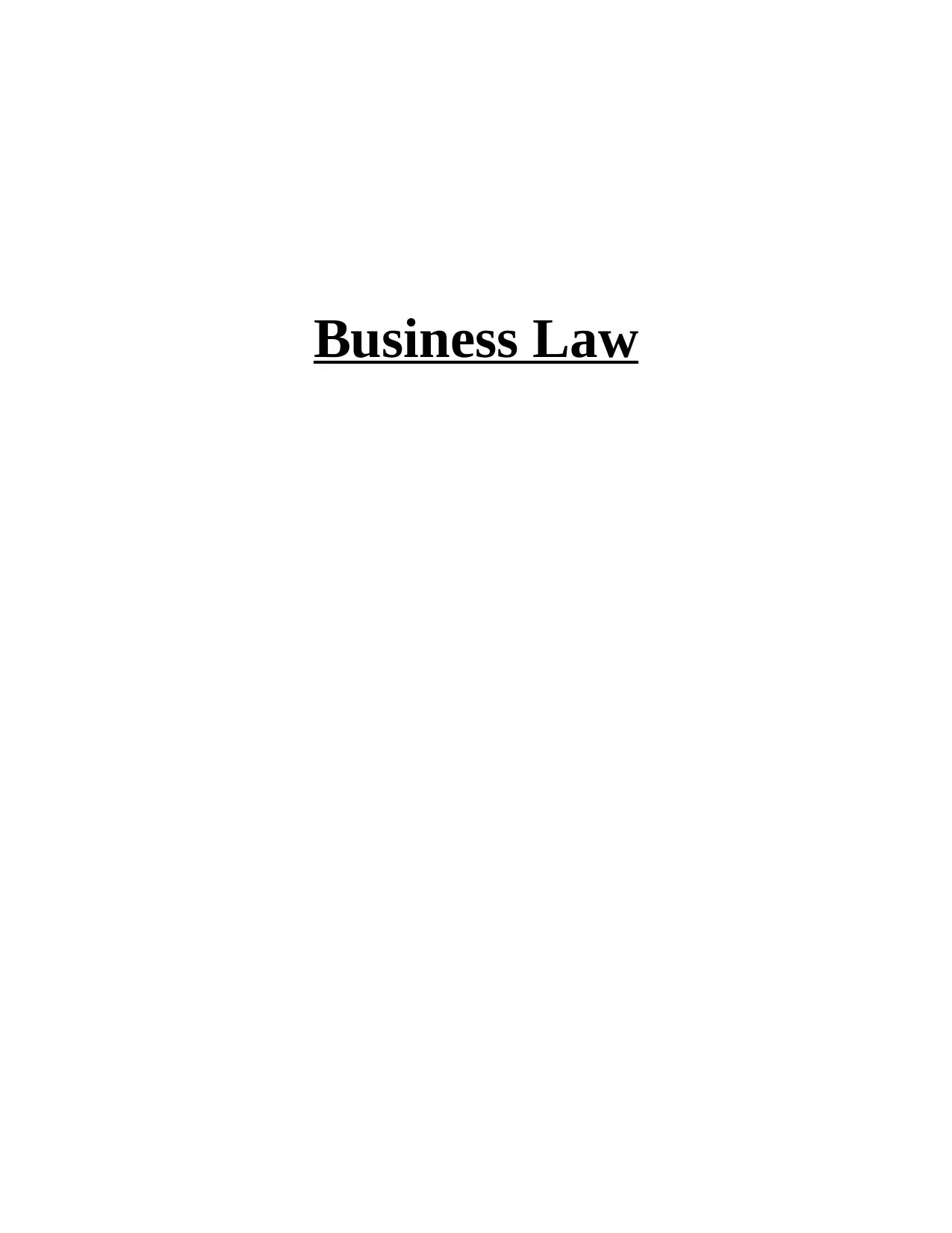
Business Law
Paraphrase This Document
Need a fresh take? Get an instant paraphrase of this document with our AI Paraphraser
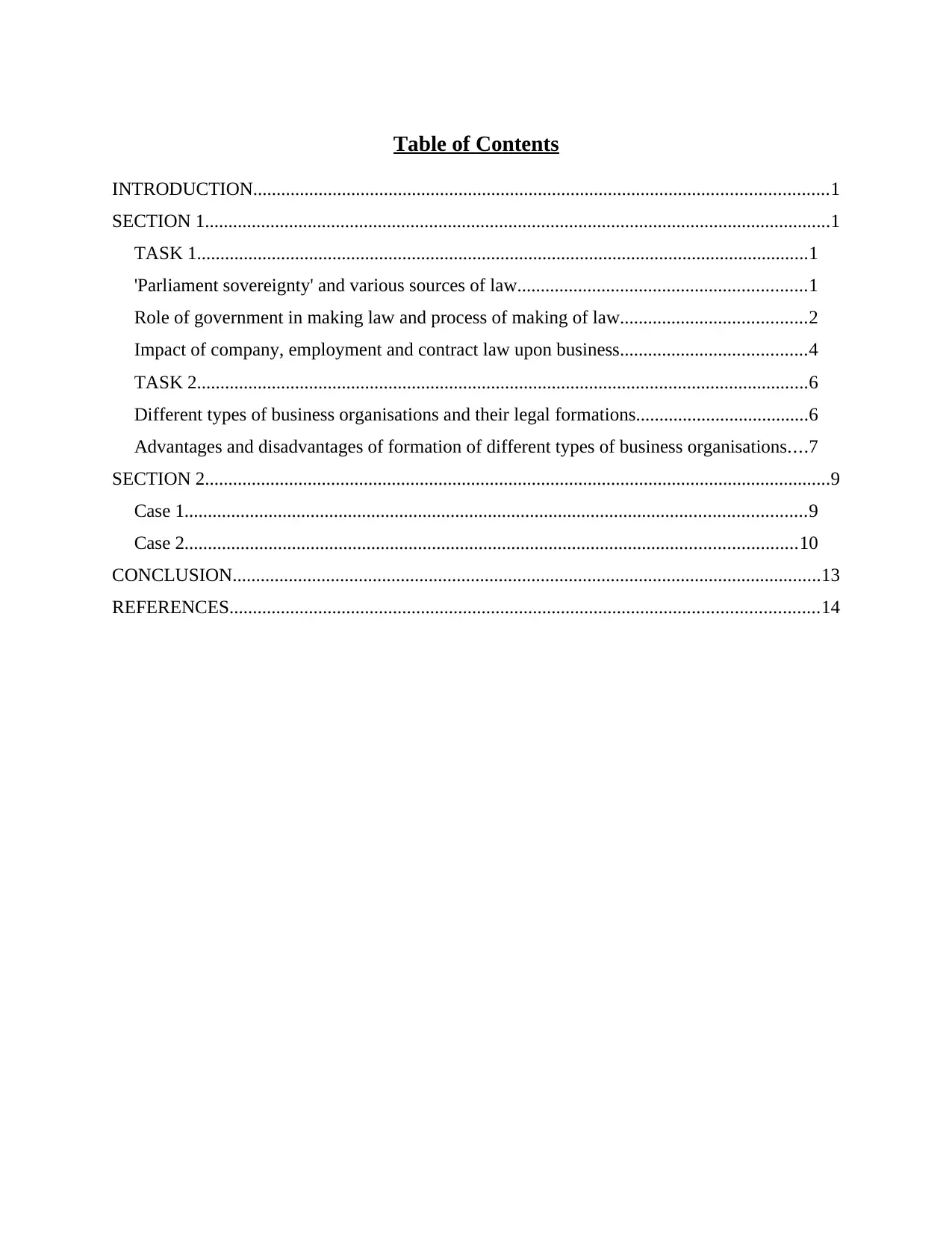
Table of Contents
INTRODUCTION...........................................................................................................................1
SECTION 1......................................................................................................................................1
TASK 1...................................................................................................................................1
'Parliament sovereignty' and various sources of law..............................................................1
Role of government in making law and process of making of law........................................2
Impact of company, employment and contract law upon business........................................4
TASK 2...................................................................................................................................6
Different types of business organisations and their legal formations.....................................6
Advantages and disadvantages of formation of different types of business organisations....7
SECTION 2......................................................................................................................................9
Case 1.....................................................................................................................................9
Case 2...................................................................................................................................10
CONCLUSION..............................................................................................................................13
REFERENCES..............................................................................................................................14
INTRODUCTION...........................................................................................................................1
SECTION 1......................................................................................................................................1
TASK 1...................................................................................................................................1
'Parliament sovereignty' and various sources of law..............................................................1
Role of government in making law and process of making of law........................................2
Impact of company, employment and contract law upon business........................................4
TASK 2...................................................................................................................................6
Different types of business organisations and their legal formations.....................................6
Advantages and disadvantages of formation of different types of business organisations....7
SECTION 2......................................................................................................................................9
Case 1.....................................................................................................................................9
Case 2...................................................................................................................................10
CONCLUSION..............................................................................................................................13
REFERENCES..............................................................................................................................14
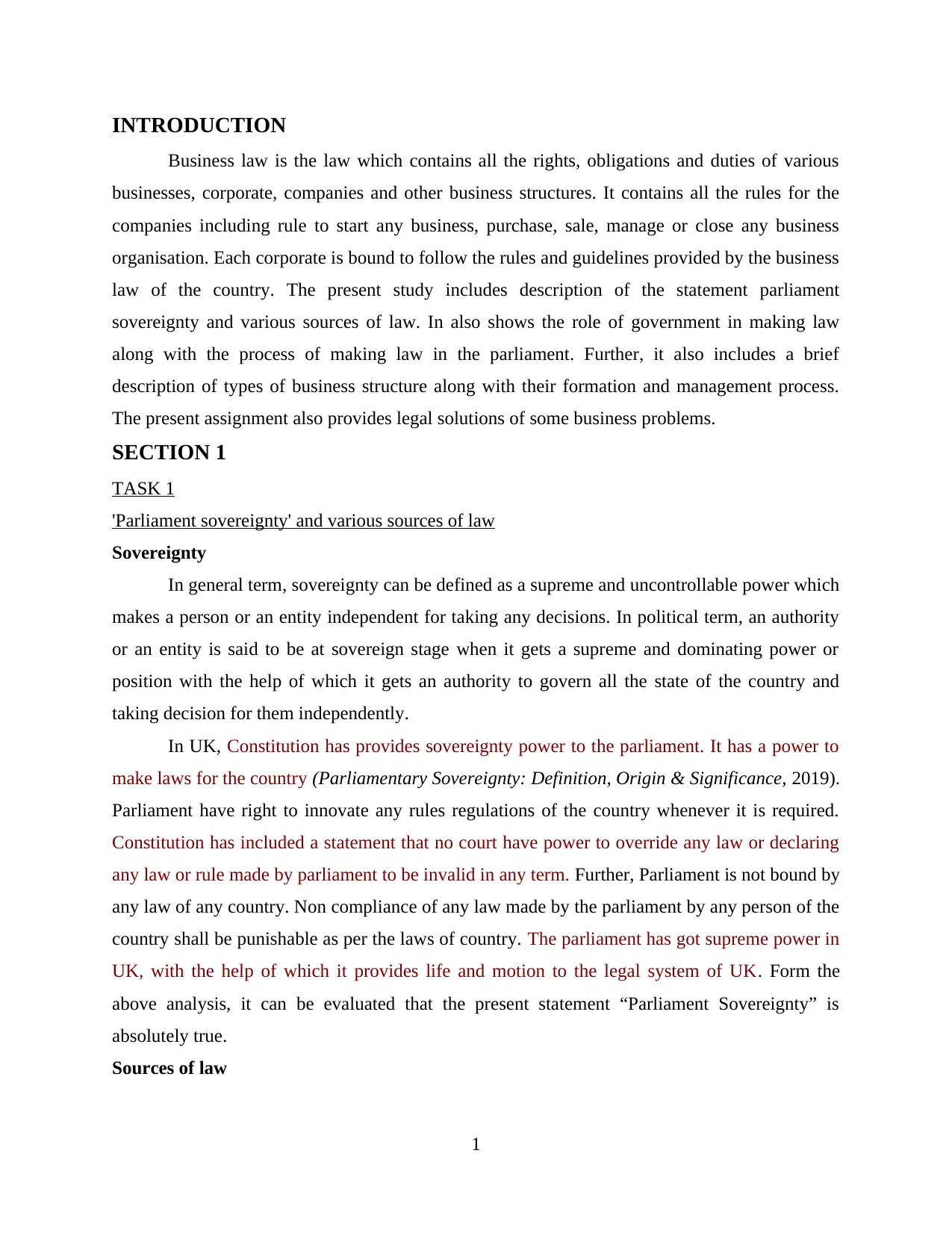
INTRODUCTION
Business law is the law which contains all the rights, obligations and duties of various
businesses, corporate, companies and other business structures. It contains all the rules for the
companies including rule to start any business, purchase, sale, manage or close any business
organisation. Each corporate is bound to follow the rules and guidelines provided by the business
law of the country. The present study includes description of the statement parliament
sovereignty and various sources of law. In also shows the role of government in making law
along with the process of making law in the parliament. Further, it also includes a brief
description of types of business structure along with their formation and management process.
The present assignment also provides legal solutions of some business problems.
SECTION 1
TASK 1
'Parliament sovereignty' and various sources of law
Sovereignty
In general term, sovereignty can be defined as a supreme and uncontrollable power which
makes a person or an entity independent for taking any decisions. In political term, an authority
or an entity is said to be at sovereign stage when it gets a supreme and dominating power or
position with the help of which it gets an authority to govern all the state of the country and
taking decision for them independently.
In UK, Constitution has provides sovereignty power to the parliament. It has a power to
make laws for the country (Parliamentary Sovereignty: Definition, Origin & Significance, 2019).
Parliament have right to innovate any rules regulations of the country whenever it is required.
Constitution has included a statement that no court have power to override any law or declaring
any law or rule made by parliament to be invalid in any term. Further, Parliament is not bound by
any law of any country. Non compliance of any law made by the parliament by any person of the
country shall be punishable as per the laws of country. The parliament has got supreme power in
UK, with the help of which it provides life and motion to the legal system of UK. Form the
above analysis, it can be evaluated that the present statement “Parliament Sovereignty” is
absolutely true.
Sources of law
1
Business law is the law which contains all the rights, obligations and duties of various
businesses, corporate, companies and other business structures. It contains all the rules for the
companies including rule to start any business, purchase, sale, manage or close any business
organisation. Each corporate is bound to follow the rules and guidelines provided by the business
law of the country. The present study includes description of the statement parliament
sovereignty and various sources of law. In also shows the role of government in making law
along with the process of making law in the parliament. Further, it also includes a brief
description of types of business structure along with their formation and management process.
The present assignment also provides legal solutions of some business problems.
SECTION 1
TASK 1
'Parliament sovereignty' and various sources of law
Sovereignty
In general term, sovereignty can be defined as a supreme and uncontrollable power which
makes a person or an entity independent for taking any decisions. In political term, an authority
or an entity is said to be at sovereign stage when it gets a supreme and dominating power or
position with the help of which it gets an authority to govern all the state of the country and
taking decision for them independently.
In UK, Constitution has provides sovereignty power to the parliament. It has a power to
make laws for the country (Parliamentary Sovereignty: Definition, Origin & Significance, 2019).
Parliament have right to innovate any rules regulations of the country whenever it is required.
Constitution has included a statement that no court have power to override any law or declaring
any law or rule made by parliament to be invalid in any term. Further, Parliament is not bound by
any law of any country. Non compliance of any law made by the parliament by any person of the
country shall be punishable as per the laws of country. The parliament has got supreme power in
UK, with the help of which it provides life and motion to the legal system of UK. Form the
above analysis, it can be evaluated that the present statement “Parliament Sovereignty” is
absolutely true.
Sources of law
1
⊘ This is a preview!⊘
Do you want full access?
Subscribe today to unlock all pages.

Trusted by 1+ million students worldwide
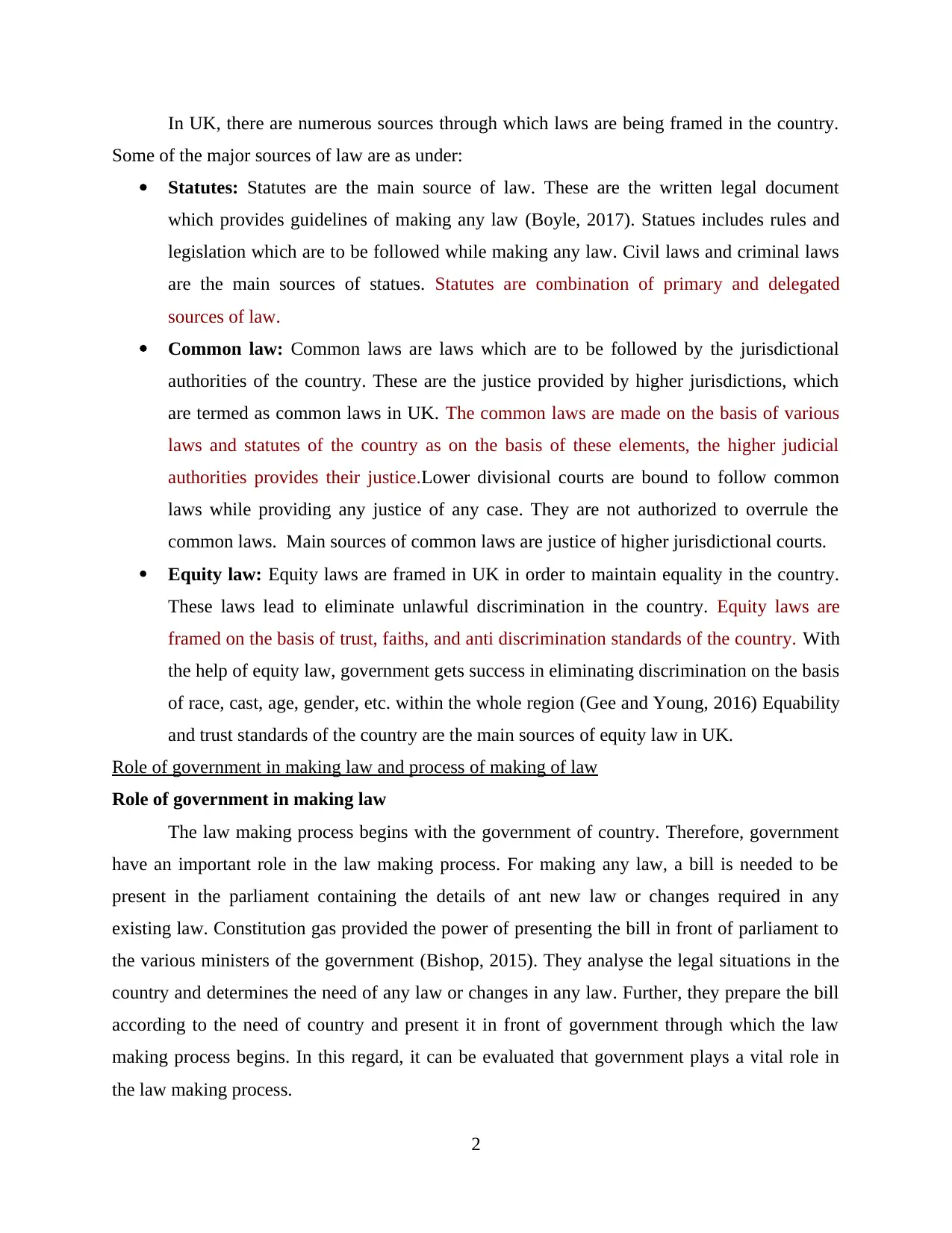
In UK, there are numerous sources through which laws are being framed in the country.
Some of the major sources of law are as under:
Statutes: Statutes are the main source of law. These are the written legal document
which provides guidelines of making any law (Boyle, 2017). Statues includes rules and
legislation which are to be followed while making any law. Civil laws and criminal laws
are the main sources of statues. Statutes are combination of primary and delegated
sources of law.
Common law: Common laws are laws which are to be followed by the jurisdictional
authorities of the country. These are the justice provided by higher jurisdictions, which
are termed as common laws in UK. The common laws are made on the basis of various
laws and statutes of the country as on the basis of these elements, the higher judicial
authorities provides their justice.Lower divisional courts are bound to follow common
laws while providing any justice of any case. They are not authorized to overrule the
common laws. Main sources of common laws are justice of higher jurisdictional courts.
Equity law: Equity laws are framed in UK in order to maintain equality in the country.
These laws lead to eliminate unlawful discrimination in the country. Equity laws are
framed on the basis of trust, faiths, and anti discrimination standards of the country. With
the help of equity law, government gets success in eliminating discrimination on the basis
of race, cast, age, gender, etc. within the whole region (Gee and Young, 2016) Equability
and trust standards of the country are the main sources of equity law in UK.
Role of government in making law and process of making of law
Role of government in making law
The law making process begins with the government of country. Therefore, government
have an important role in the law making process. For making any law, a bill is needed to be
present in the parliament containing the details of ant new law or changes required in any
existing law. Constitution gas provided the power of presenting the bill in front of parliament to
the various ministers of the government (Bishop, 2015). They analyse the legal situations in the
country and determines the need of any law or changes in any law. Further, they prepare the bill
according to the need of country and present it in front of government through which the law
making process begins. In this regard, it can be evaluated that government plays a vital role in
the law making process.
2
Some of the major sources of law are as under:
Statutes: Statutes are the main source of law. These are the written legal document
which provides guidelines of making any law (Boyle, 2017). Statues includes rules and
legislation which are to be followed while making any law. Civil laws and criminal laws
are the main sources of statues. Statutes are combination of primary and delegated
sources of law.
Common law: Common laws are laws which are to be followed by the jurisdictional
authorities of the country. These are the justice provided by higher jurisdictions, which
are termed as common laws in UK. The common laws are made on the basis of various
laws and statutes of the country as on the basis of these elements, the higher judicial
authorities provides their justice.Lower divisional courts are bound to follow common
laws while providing any justice of any case. They are not authorized to overrule the
common laws. Main sources of common laws are justice of higher jurisdictional courts.
Equity law: Equity laws are framed in UK in order to maintain equality in the country.
These laws lead to eliminate unlawful discrimination in the country. Equity laws are
framed on the basis of trust, faiths, and anti discrimination standards of the country. With
the help of equity law, government gets success in eliminating discrimination on the basis
of race, cast, age, gender, etc. within the whole region (Gee and Young, 2016) Equability
and trust standards of the country are the main sources of equity law in UK.
Role of government in making law and process of making of law
Role of government in making law
The law making process begins with the government of country. Therefore, government
have an important role in the law making process. For making any law, a bill is needed to be
present in the parliament containing the details of ant new law or changes required in any
existing law. Constitution gas provided the power of presenting the bill in front of parliament to
the various ministers of the government (Bishop, 2015). They analyse the legal situations in the
country and determines the need of any law or changes in any law. Further, they prepare the bill
according to the need of country and present it in front of government through which the law
making process begins. In this regard, it can be evaluated that government plays a vital role in
the law making process.
2
Paraphrase This Document
Need a fresh take? Get an instant paraphrase of this document with our AI Paraphraser
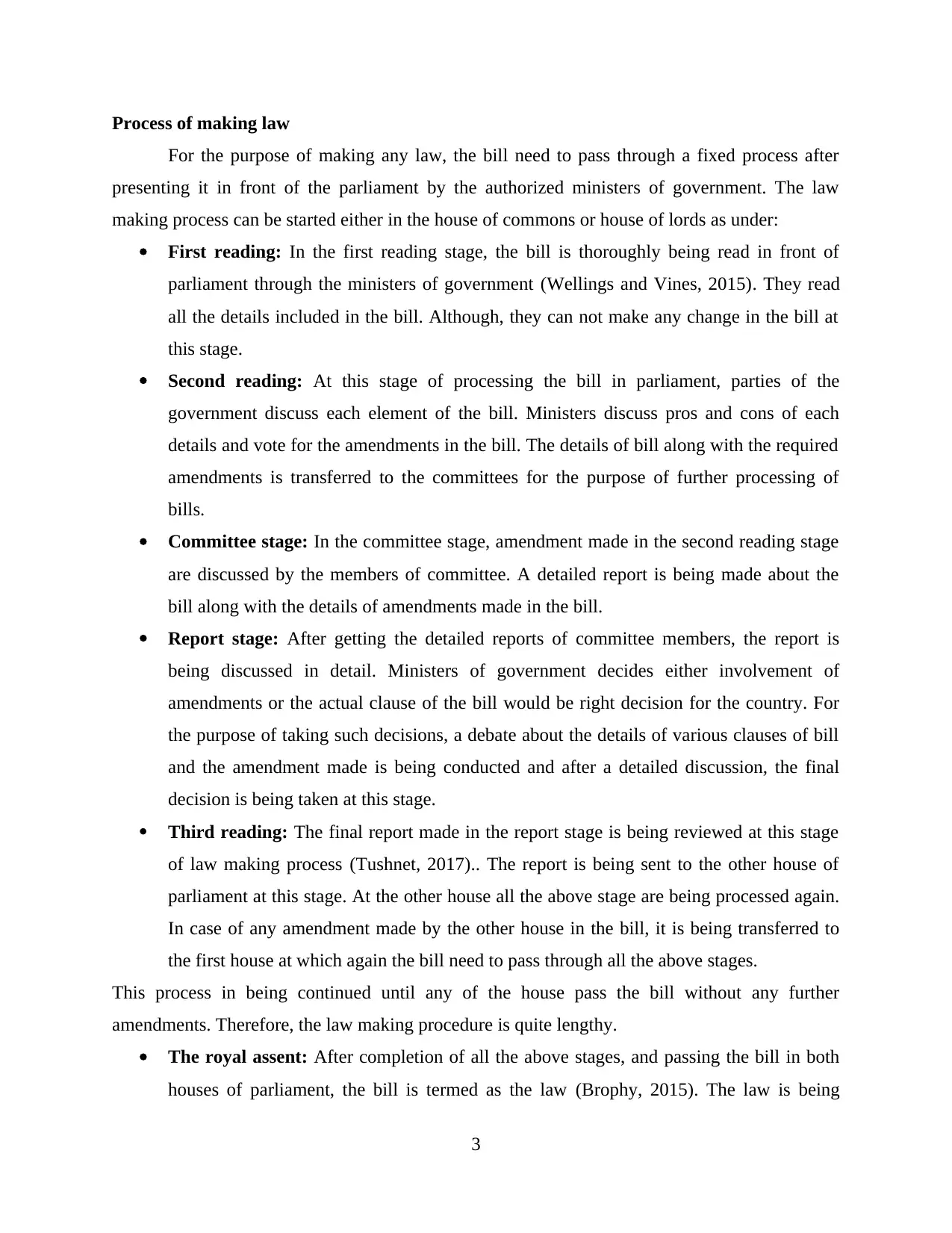
Process of making law
For the purpose of making any law, the bill need to pass through a fixed process after
presenting it in front of the parliament by the authorized ministers of government. The law
making process can be started either in the house of commons or house of lords as under:
First reading: In the first reading stage, the bill is thoroughly being read in front of
parliament through the ministers of government (Wellings and Vines, 2015). They read
all the details included in the bill. Although, they can not make any change in the bill at
this stage.
Second reading: At this stage of processing the bill in parliament, parties of the
government discuss each element of the bill. Ministers discuss pros and cons of each
details and vote for the amendments in the bill. The details of bill along with the required
amendments is transferred to the committees for the purpose of further processing of
bills.
Committee stage: In the committee stage, amendment made in the second reading stage
are discussed by the members of committee. A detailed report is being made about the
bill along with the details of amendments made in the bill.
Report stage: After getting the detailed reports of committee members, the report is
being discussed in detail. Ministers of government decides either involvement of
amendments or the actual clause of the bill would be right decision for the country. For
the purpose of taking such decisions, a debate about the details of various clauses of bill
and the amendment made is being conducted and after a detailed discussion, the final
decision is being taken at this stage.
Third reading: The final report made in the report stage is being reviewed at this stage
of law making process (Tushnet, 2017).. The report is being sent to the other house of
parliament at this stage. At the other house all the above stage are being processed again.
In case of any amendment made by the other house in the bill, it is being transferred to
the first house at which again the bill need to pass through all the above stages.
This process in being continued until any of the house pass the bill without any further
amendments. Therefore, the law making procedure is quite lengthy.
The royal assent: After completion of all the above stages, and passing the bill in both
houses of parliament, the bill is termed as the law (Brophy, 2015). The law is being
3
For the purpose of making any law, the bill need to pass through a fixed process after
presenting it in front of the parliament by the authorized ministers of government. The law
making process can be started either in the house of commons or house of lords as under:
First reading: In the first reading stage, the bill is thoroughly being read in front of
parliament through the ministers of government (Wellings and Vines, 2015). They read
all the details included in the bill. Although, they can not make any change in the bill at
this stage.
Second reading: At this stage of processing the bill in parliament, parties of the
government discuss each element of the bill. Ministers discuss pros and cons of each
details and vote for the amendments in the bill. The details of bill along with the required
amendments is transferred to the committees for the purpose of further processing of
bills.
Committee stage: In the committee stage, amendment made in the second reading stage
are discussed by the members of committee. A detailed report is being made about the
bill along with the details of amendments made in the bill.
Report stage: After getting the detailed reports of committee members, the report is
being discussed in detail. Ministers of government decides either involvement of
amendments or the actual clause of the bill would be right decision for the country. For
the purpose of taking such decisions, a debate about the details of various clauses of bill
and the amendment made is being conducted and after a detailed discussion, the final
decision is being taken at this stage.
Third reading: The final report made in the report stage is being reviewed at this stage
of law making process (Tushnet, 2017).. The report is being sent to the other house of
parliament at this stage. At the other house all the above stage are being processed again.
In case of any amendment made by the other house in the bill, it is being transferred to
the first house at which again the bill need to pass through all the above stages.
This process in being continued until any of the house pass the bill without any further
amendments. Therefore, the law making procedure is quite lengthy.
The royal assent: After completion of all the above stages, and passing the bill in both
houses of parliament, the bill is termed as the law (Brophy, 2015). The law is being
3
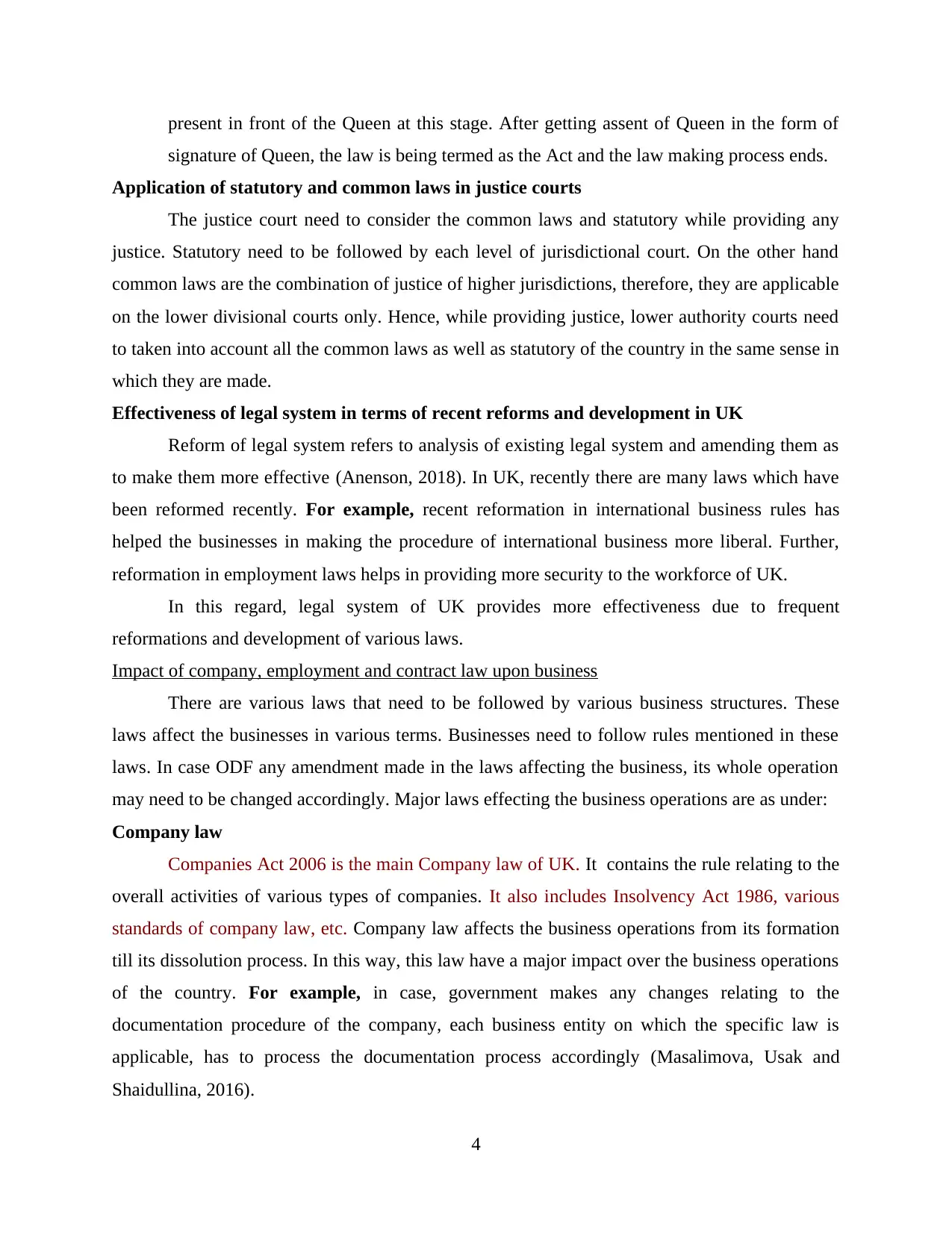
present in front of the Queen at this stage. After getting assent of Queen in the form of
signature of Queen, the law is being termed as the Act and the law making process ends.
Application of statutory and common laws in justice courts
The justice court need to consider the common laws and statutory while providing any
justice. Statutory need to be followed by each level of jurisdictional court. On the other hand
common laws are the combination of justice of higher jurisdictions, therefore, they are applicable
on the lower divisional courts only. Hence, while providing justice, lower authority courts need
to taken into account all the common laws as well as statutory of the country in the same sense in
which they are made.
Effectiveness of legal system in terms of recent reforms and development in UK
Reform of legal system refers to analysis of existing legal system and amending them as
to make them more effective (Anenson, 2018). In UK, recently there are many laws which have
been reformed recently. For example, recent reformation in international business rules has
helped the businesses in making the procedure of international business more liberal. Further,
reformation in employment laws helps in providing more security to the workforce of UK.
In this regard, legal system of UK provides more effectiveness due to frequent
reformations and development of various laws.
Impact of company, employment and contract law upon business
There are various laws that need to be followed by various business structures. These
laws affect the businesses in various terms. Businesses need to follow rules mentioned in these
laws. In case ODF any amendment made in the laws affecting the business, its whole operation
may need to be changed accordingly. Major laws effecting the business operations are as under:
Company law
Companies Act 2006 is the main Company law of UK. It contains the rule relating to the
overall activities of various types of companies. It also includes Insolvency Act 1986, various
standards of company law, etc. Company law affects the business operations from its formation
till its dissolution process. In this way, this law have a major impact over the business operations
of the country. For example, in case, government makes any changes relating to the
documentation procedure of the company, each business entity on which the specific law is
applicable, has to process the documentation process accordingly (Masalimova, Usak and
Shaidullina, 2016).
4
signature of Queen, the law is being termed as the Act and the law making process ends.
Application of statutory and common laws in justice courts
The justice court need to consider the common laws and statutory while providing any
justice. Statutory need to be followed by each level of jurisdictional court. On the other hand
common laws are the combination of justice of higher jurisdictions, therefore, they are applicable
on the lower divisional courts only. Hence, while providing justice, lower authority courts need
to taken into account all the common laws as well as statutory of the country in the same sense in
which they are made.
Effectiveness of legal system in terms of recent reforms and development in UK
Reform of legal system refers to analysis of existing legal system and amending them as
to make them more effective (Anenson, 2018). In UK, recently there are many laws which have
been reformed recently. For example, recent reformation in international business rules has
helped the businesses in making the procedure of international business more liberal. Further,
reformation in employment laws helps in providing more security to the workforce of UK.
In this regard, legal system of UK provides more effectiveness due to frequent
reformations and development of various laws.
Impact of company, employment and contract law upon business
There are various laws that need to be followed by various business structures. These
laws affect the businesses in various terms. Businesses need to follow rules mentioned in these
laws. In case ODF any amendment made in the laws affecting the business, its whole operation
may need to be changed accordingly. Major laws effecting the business operations are as under:
Company law
Companies Act 2006 is the main Company law of UK. It contains the rule relating to the
overall activities of various types of companies. It also includes Insolvency Act 1986, various
standards of company law, etc. Company law affects the business operations from its formation
till its dissolution process. In this way, this law have a major impact over the business operations
of the country. For example, in case, government makes any changes relating to the
documentation procedure of the company, each business entity on which the specific law is
applicable, has to process the documentation process accordingly (Masalimova, Usak and
Shaidullina, 2016).
4
⊘ This is a preview!⊘
Do you want full access?
Subscribe today to unlock all pages.

Trusted by 1+ million students worldwide
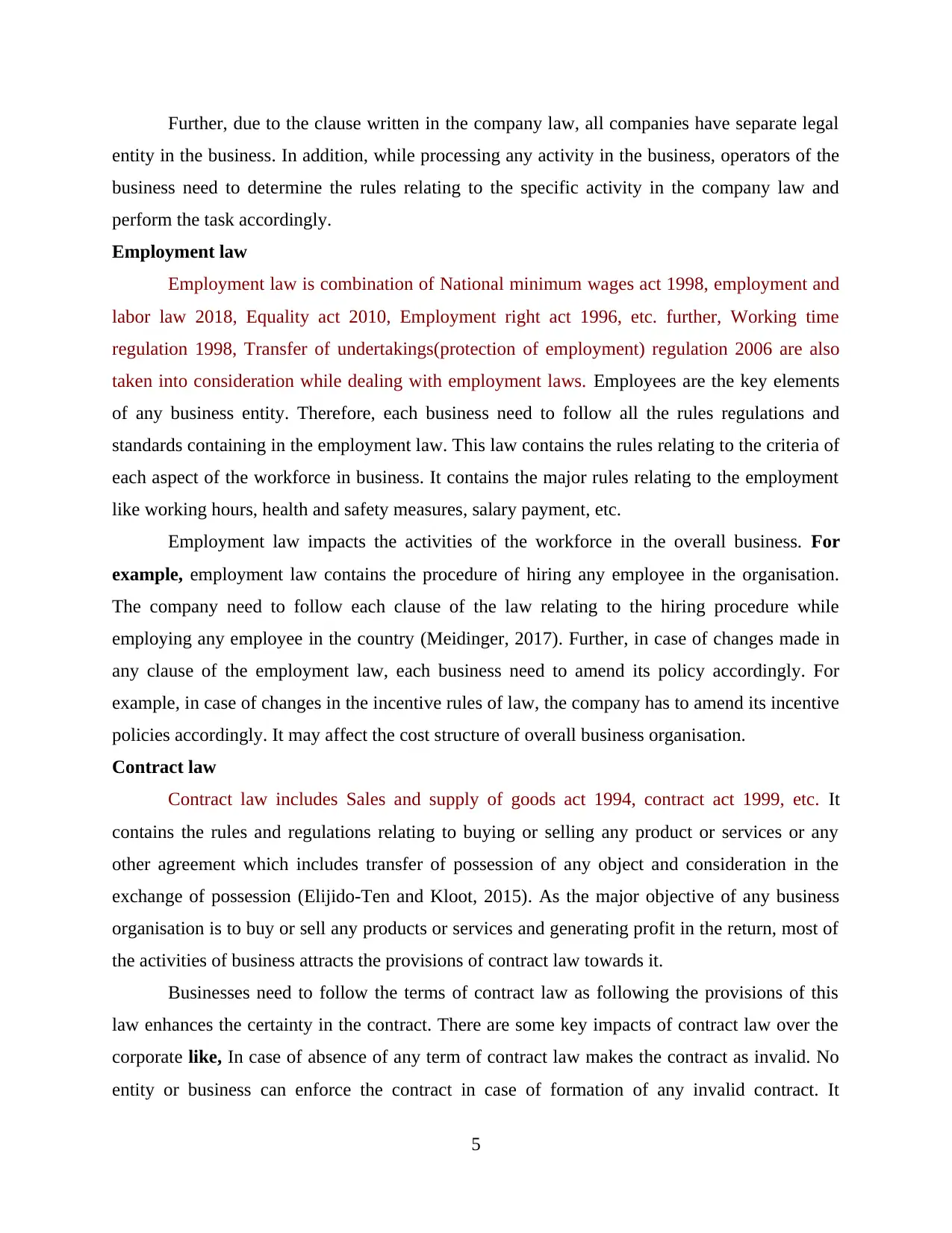
Further, due to the clause written in the company law, all companies have separate legal
entity in the business. In addition, while processing any activity in the business, operators of the
business need to determine the rules relating to the specific activity in the company law and
perform the task accordingly.
Employment law
Employment law is combination of National minimum wages act 1998, employment and
labor law 2018, Equality act 2010, Employment right act 1996, etc. further, Working time
regulation 1998, Transfer of undertakings(protection of employment) regulation 2006 are also
taken into consideration while dealing with employment laws. Employees are the key elements
of any business entity. Therefore, each business need to follow all the rules regulations and
standards containing in the employment law. This law contains the rules relating to the criteria of
each aspect of the workforce in business. It contains the major rules relating to the employment
like working hours, health and safety measures, salary payment, etc.
Employment law impacts the activities of the workforce in the overall business. For
example, employment law contains the procedure of hiring any employee in the organisation.
The company need to follow each clause of the law relating to the hiring procedure while
employing any employee in the country (Meidinger, 2017). Further, in case of changes made in
any clause of the employment law, each business need to amend its policy accordingly. For
example, in case of changes in the incentive rules of law, the company has to amend its incentive
policies accordingly. It may affect the cost structure of overall business organisation.
Contract law
Contract law includes Sales and supply of goods act 1994, contract act 1999, etc. It
contains the rules and regulations relating to buying or selling any product or services or any
other agreement which includes transfer of possession of any object and consideration in the
exchange of possession (Elijido-Ten and Kloot, 2015). As the major objective of any business
organisation is to buy or sell any products or services and generating profit in the return, most of
the activities of business attracts the provisions of contract law towards it.
Businesses need to follow the terms of contract law as following the provisions of this
law enhances the certainty in the contract. There are some key impacts of contract law over the
corporate like, In case of absence of any term of contract law makes the contract as invalid. No
entity or business can enforce the contract in case of formation of any invalid contract. It
5
entity in the business. In addition, while processing any activity in the business, operators of the
business need to determine the rules relating to the specific activity in the company law and
perform the task accordingly.
Employment law
Employment law is combination of National minimum wages act 1998, employment and
labor law 2018, Equality act 2010, Employment right act 1996, etc. further, Working time
regulation 1998, Transfer of undertakings(protection of employment) regulation 2006 are also
taken into consideration while dealing with employment laws. Employees are the key elements
of any business entity. Therefore, each business need to follow all the rules regulations and
standards containing in the employment law. This law contains the rules relating to the criteria of
each aspect of the workforce in business. It contains the major rules relating to the employment
like working hours, health and safety measures, salary payment, etc.
Employment law impacts the activities of the workforce in the overall business. For
example, employment law contains the procedure of hiring any employee in the organisation.
The company need to follow each clause of the law relating to the hiring procedure while
employing any employee in the country (Meidinger, 2017). Further, in case of changes made in
any clause of the employment law, each business need to amend its policy accordingly. For
example, in case of changes in the incentive rules of law, the company has to amend its incentive
policies accordingly. It may affect the cost structure of overall business organisation.
Contract law
Contract law includes Sales and supply of goods act 1994, contract act 1999, etc. It
contains the rules and regulations relating to buying or selling any product or services or any
other agreement which includes transfer of possession of any object and consideration in the
exchange of possession (Elijido-Ten and Kloot, 2015). As the major objective of any business
organisation is to buy or sell any products or services and generating profit in the return, most of
the activities of business attracts the provisions of contract law towards it.
Businesses need to follow the terms of contract law as following the provisions of this
law enhances the certainty in the contract. There are some key impacts of contract law over the
corporate like, In case of absence of any term of contract law makes the contract as invalid. No
entity or business can enforce the contract in case of formation of any invalid contract. It
5
Paraphrase This Document
Need a fresh take? Get an instant paraphrase of this document with our AI Paraphraser
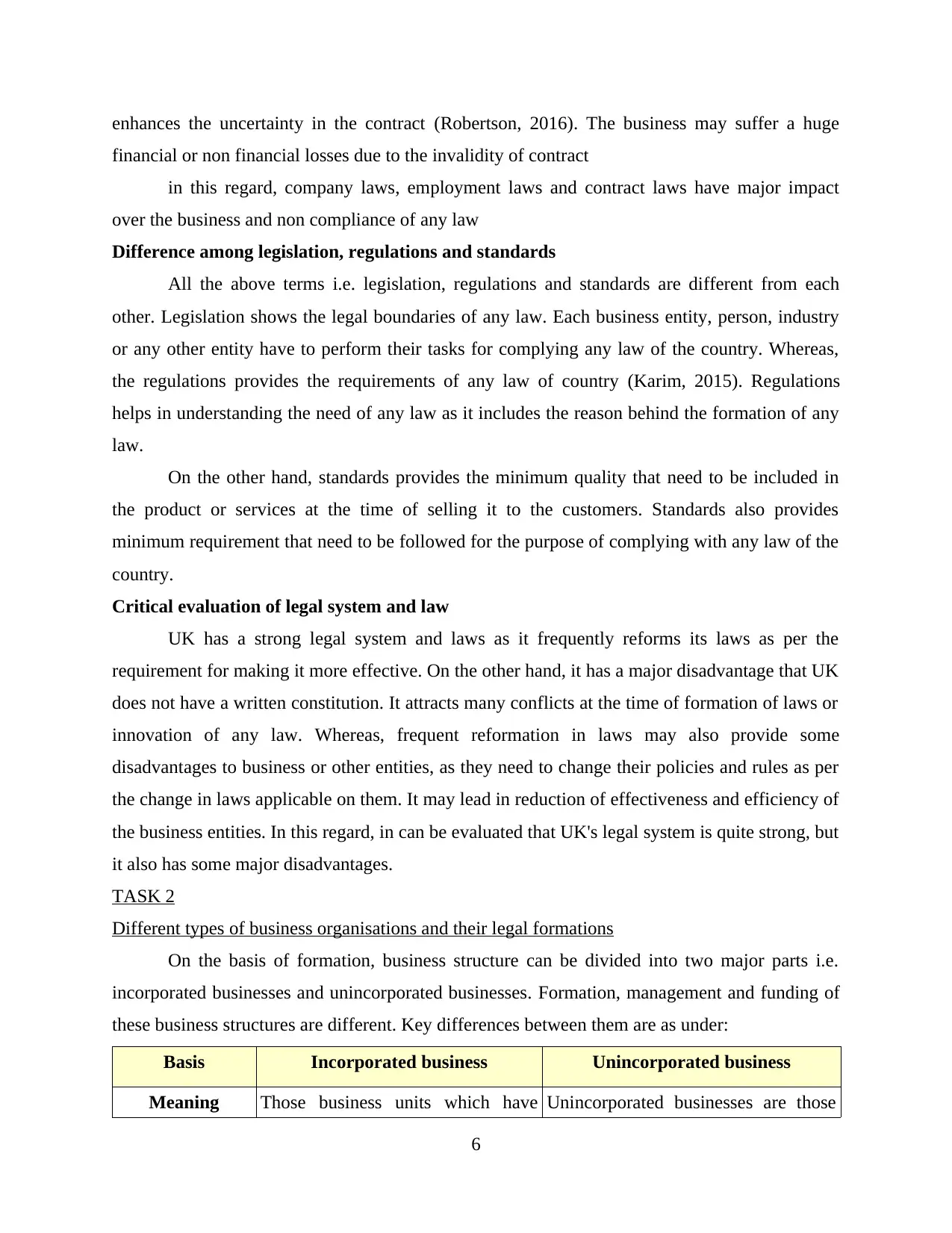
enhances the uncertainty in the contract (Robertson, 2016). The business may suffer a huge
financial or non financial losses due to the invalidity of contract
in this regard, company laws, employment laws and contract laws have major impact
over the business and non compliance of any law
Difference among legislation, regulations and standards
All the above terms i.e. legislation, regulations and standards are different from each
other. Legislation shows the legal boundaries of any law. Each business entity, person, industry
or any other entity have to perform their tasks for complying any law of the country. Whereas,
the regulations provides the requirements of any law of country (Karim, 2015). Regulations
helps in understanding the need of any law as it includes the reason behind the formation of any
law.
On the other hand, standards provides the minimum quality that need to be included in
the product or services at the time of selling it to the customers. Standards also provides
minimum requirement that need to be followed for the purpose of complying with any law of the
country.
Critical evaluation of legal system and law
UK has a strong legal system and laws as it frequently reforms its laws as per the
requirement for making it more effective. On the other hand, it has a major disadvantage that UK
does not have a written constitution. It attracts many conflicts at the time of formation of laws or
innovation of any law. Whereas, frequent reformation in laws may also provide some
disadvantages to business or other entities, as they need to change their policies and rules as per
the change in laws applicable on them. It may lead in reduction of effectiveness and efficiency of
the business entities. In this regard, in can be evaluated that UK's legal system is quite strong, but
it also has some major disadvantages.
TASK 2
Different types of business organisations and their legal formations
On the basis of formation, business structure can be divided into two major parts i.e.
incorporated businesses and unincorporated businesses. Formation, management and funding of
these business structures are different. Key differences between them are as under:
Basis Incorporated business Unincorporated business
Meaning Those business units which have Unincorporated businesses are those
6
financial or non financial losses due to the invalidity of contract
in this regard, company laws, employment laws and contract laws have major impact
over the business and non compliance of any law
Difference among legislation, regulations and standards
All the above terms i.e. legislation, regulations and standards are different from each
other. Legislation shows the legal boundaries of any law. Each business entity, person, industry
or any other entity have to perform their tasks for complying any law of the country. Whereas,
the regulations provides the requirements of any law of country (Karim, 2015). Regulations
helps in understanding the need of any law as it includes the reason behind the formation of any
law.
On the other hand, standards provides the minimum quality that need to be included in
the product or services at the time of selling it to the customers. Standards also provides
minimum requirement that need to be followed for the purpose of complying with any law of the
country.
Critical evaluation of legal system and law
UK has a strong legal system and laws as it frequently reforms its laws as per the
requirement for making it more effective. On the other hand, it has a major disadvantage that UK
does not have a written constitution. It attracts many conflicts at the time of formation of laws or
innovation of any law. Whereas, frequent reformation in laws may also provide some
disadvantages to business or other entities, as they need to change their policies and rules as per
the change in laws applicable on them. It may lead in reduction of effectiveness and efficiency of
the business entities. In this regard, in can be evaluated that UK's legal system is quite strong, but
it also has some major disadvantages.
TASK 2
Different types of business organisations and their legal formations
On the basis of formation, business structure can be divided into two major parts i.e.
incorporated businesses and unincorporated businesses. Formation, management and funding of
these business structures are different. Key differences between them are as under:
Basis Incorporated business Unincorporated business
Meaning Those business units which have Unincorporated businesses are those
6
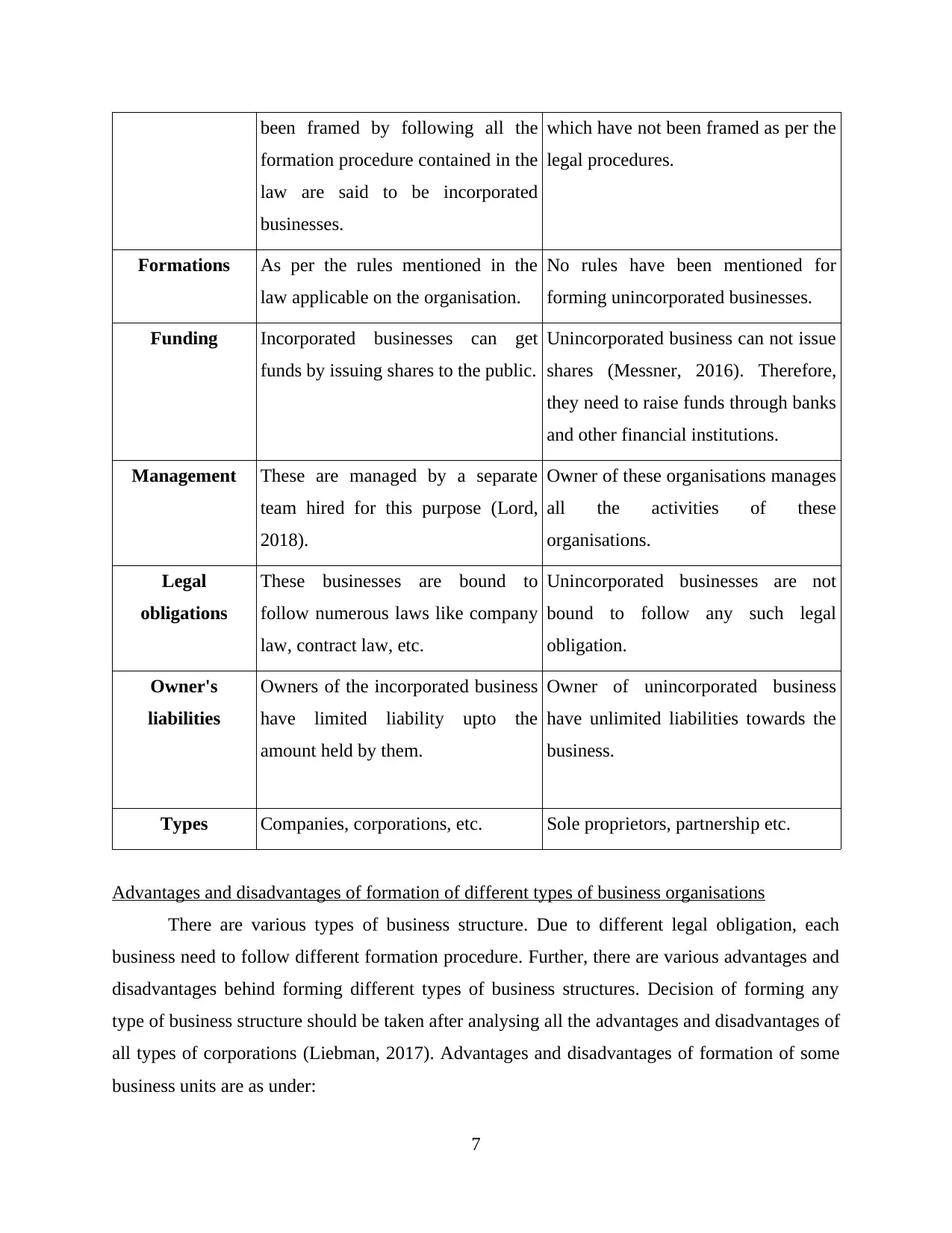
been framed by following all the
formation procedure contained in the
law are said to be incorporated
businesses.
which have not been framed as per the
legal procedures.
Formations As per the rules mentioned in the
law applicable on the organisation.
No rules have been mentioned for
forming unincorporated businesses.
Funding Incorporated businesses can get
funds by issuing shares to the public.
Unincorporated business can not issue
shares (Messner, 2016). Therefore,
they need to raise funds through banks
and other financial institutions.
Management These are managed by a separate
team hired for this purpose (Lord,
2018).
Owner of these organisations manages
all the activities of these
organisations.
Legal
obligations
These businesses are bound to
follow numerous laws like company
law, contract law, etc.
Unincorporated businesses are not
bound to follow any such legal
obligation.
Owner's
liabilities
Owners of the incorporated business
have limited liability upto the
amount held by them.
Owner of unincorporated business
have unlimited liabilities towards the
business.
Types Companies, corporations, etc. Sole proprietors, partnership etc.
Advantages and disadvantages of formation of different types of business organisations
There are various types of business structure. Due to different legal obligation, each
business need to follow different formation procedure. Further, there are various advantages and
disadvantages behind forming different types of business structures. Decision of forming any
type of business structure should be taken after analysing all the advantages and disadvantages of
all types of corporations (Liebman, 2017). Advantages and disadvantages of formation of some
business units are as under:
7
formation procedure contained in the
law are said to be incorporated
businesses.
which have not been framed as per the
legal procedures.
Formations As per the rules mentioned in the
law applicable on the organisation.
No rules have been mentioned for
forming unincorporated businesses.
Funding Incorporated businesses can get
funds by issuing shares to the public.
Unincorporated business can not issue
shares (Messner, 2016). Therefore,
they need to raise funds through banks
and other financial institutions.
Management These are managed by a separate
team hired for this purpose (Lord,
2018).
Owner of these organisations manages
all the activities of these
organisations.
Legal
obligations
These businesses are bound to
follow numerous laws like company
law, contract law, etc.
Unincorporated businesses are not
bound to follow any such legal
obligation.
Owner's
liabilities
Owners of the incorporated business
have limited liability upto the
amount held by them.
Owner of unincorporated business
have unlimited liabilities towards the
business.
Types Companies, corporations, etc. Sole proprietors, partnership etc.
Advantages and disadvantages of formation of different types of business organisations
There are various types of business structure. Due to different legal obligation, each
business need to follow different formation procedure. Further, there are various advantages and
disadvantages behind forming different types of business structures. Decision of forming any
type of business structure should be taken after analysing all the advantages and disadvantages of
all types of corporations (Liebman, 2017). Advantages and disadvantages of formation of some
business units are as under:
7
⊘ This is a preview!⊘
Do you want full access?
Subscribe today to unlock all pages.

Trusted by 1+ million students worldwide
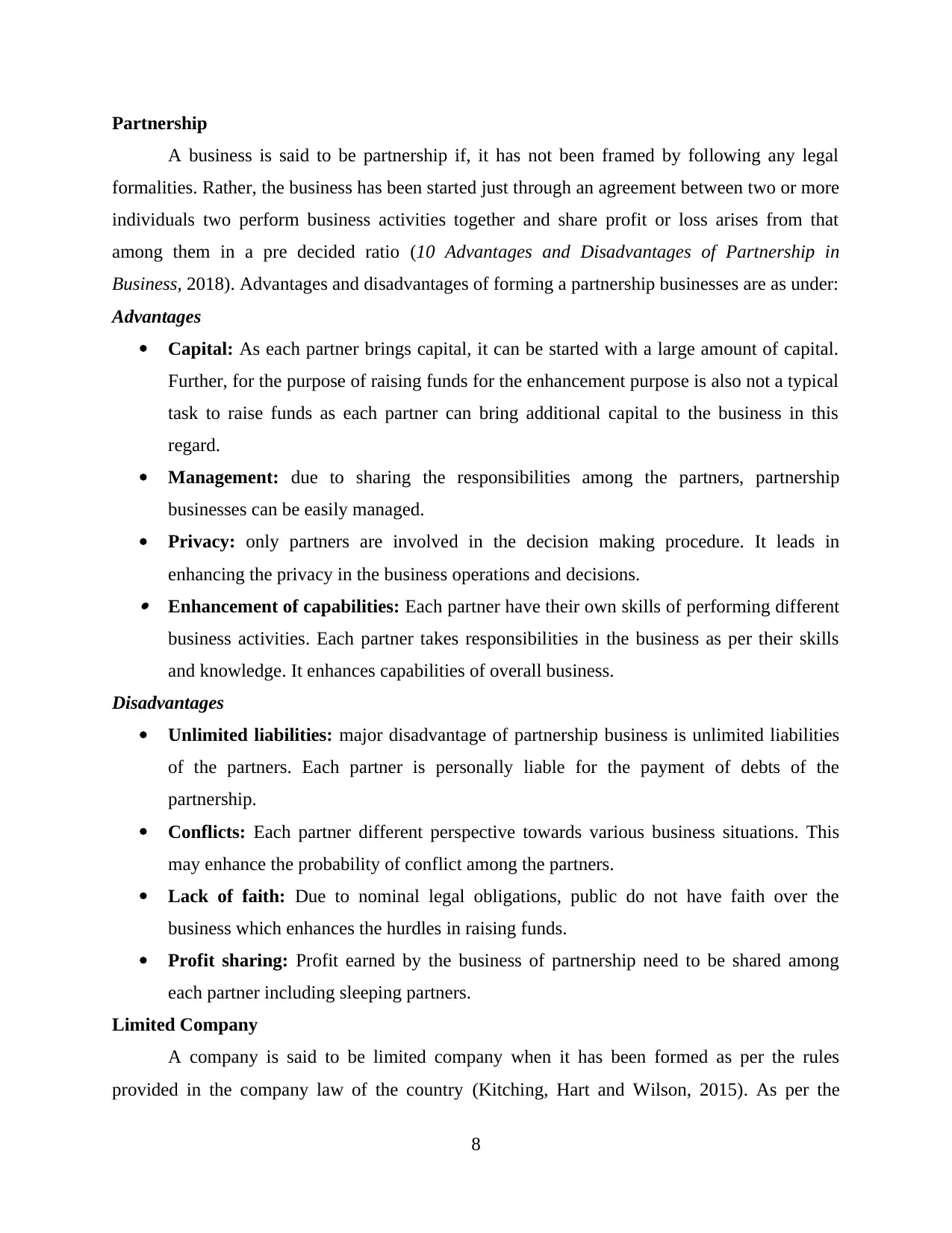
Partnership
A business is said to be partnership if, it has not been framed by following any legal
formalities. Rather, the business has been started just through an agreement between two or more
individuals two perform business activities together and share profit or loss arises from that
among them in a pre decided ratio (10 Advantages and Disadvantages of Partnership in
Business, 2018). Advantages and disadvantages of forming a partnership businesses are as under:
Advantages
Capital: As each partner brings capital, it can be started with a large amount of capital.
Further, for the purpose of raising funds for the enhancement purpose is also not a typical
task to raise funds as each partner can bring additional capital to the business in this
regard.
Management: due to sharing the responsibilities among the partners, partnership
businesses can be easily managed.
Privacy: only partners are involved in the decision making procedure. It leads in
enhancing the privacy in the business operations and decisions. Enhancement of capabilities: Each partner have their own skills of performing different
business activities. Each partner takes responsibilities in the business as per their skills
and knowledge. It enhances capabilities of overall business.
Disadvantages
Unlimited liabilities: major disadvantage of partnership business is unlimited liabilities
of the partners. Each partner is personally liable for the payment of debts of the
partnership.
Conflicts: Each partner different perspective towards various business situations. This
may enhance the probability of conflict among the partners.
Lack of faith: Due to nominal legal obligations, public do not have faith over the
business which enhances the hurdles in raising funds.
Profit sharing: Profit earned by the business of partnership need to be shared among
each partner including sleeping partners.
Limited Company
A company is said to be limited company when it has been formed as per the rules
provided in the company law of the country (Kitching, Hart and Wilson, 2015). As per the
8
A business is said to be partnership if, it has not been framed by following any legal
formalities. Rather, the business has been started just through an agreement between two or more
individuals two perform business activities together and share profit or loss arises from that
among them in a pre decided ratio (10 Advantages and Disadvantages of Partnership in
Business, 2018). Advantages and disadvantages of forming a partnership businesses are as under:
Advantages
Capital: As each partner brings capital, it can be started with a large amount of capital.
Further, for the purpose of raising funds for the enhancement purpose is also not a typical
task to raise funds as each partner can bring additional capital to the business in this
regard.
Management: due to sharing the responsibilities among the partners, partnership
businesses can be easily managed.
Privacy: only partners are involved in the decision making procedure. It leads in
enhancing the privacy in the business operations and decisions. Enhancement of capabilities: Each partner have their own skills of performing different
business activities. Each partner takes responsibilities in the business as per their skills
and knowledge. It enhances capabilities of overall business.
Disadvantages
Unlimited liabilities: major disadvantage of partnership business is unlimited liabilities
of the partners. Each partner is personally liable for the payment of debts of the
partnership.
Conflicts: Each partner different perspective towards various business situations. This
may enhance the probability of conflict among the partners.
Lack of faith: Due to nominal legal obligations, public do not have faith over the
business which enhances the hurdles in raising funds.
Profit sharing: Profit earned by the business of partnership need to be shared among
each partner including sleeping partners.
Limited Company
A company is said to be limited company when it has been formed as per the rules
provided in the company law of the country (Kitching, Hart and Wilson, 2015). As per the
8
Paraphrase This Document
Need a fresh take? Get an instant paraphrase of this document with our AI Paraphraser
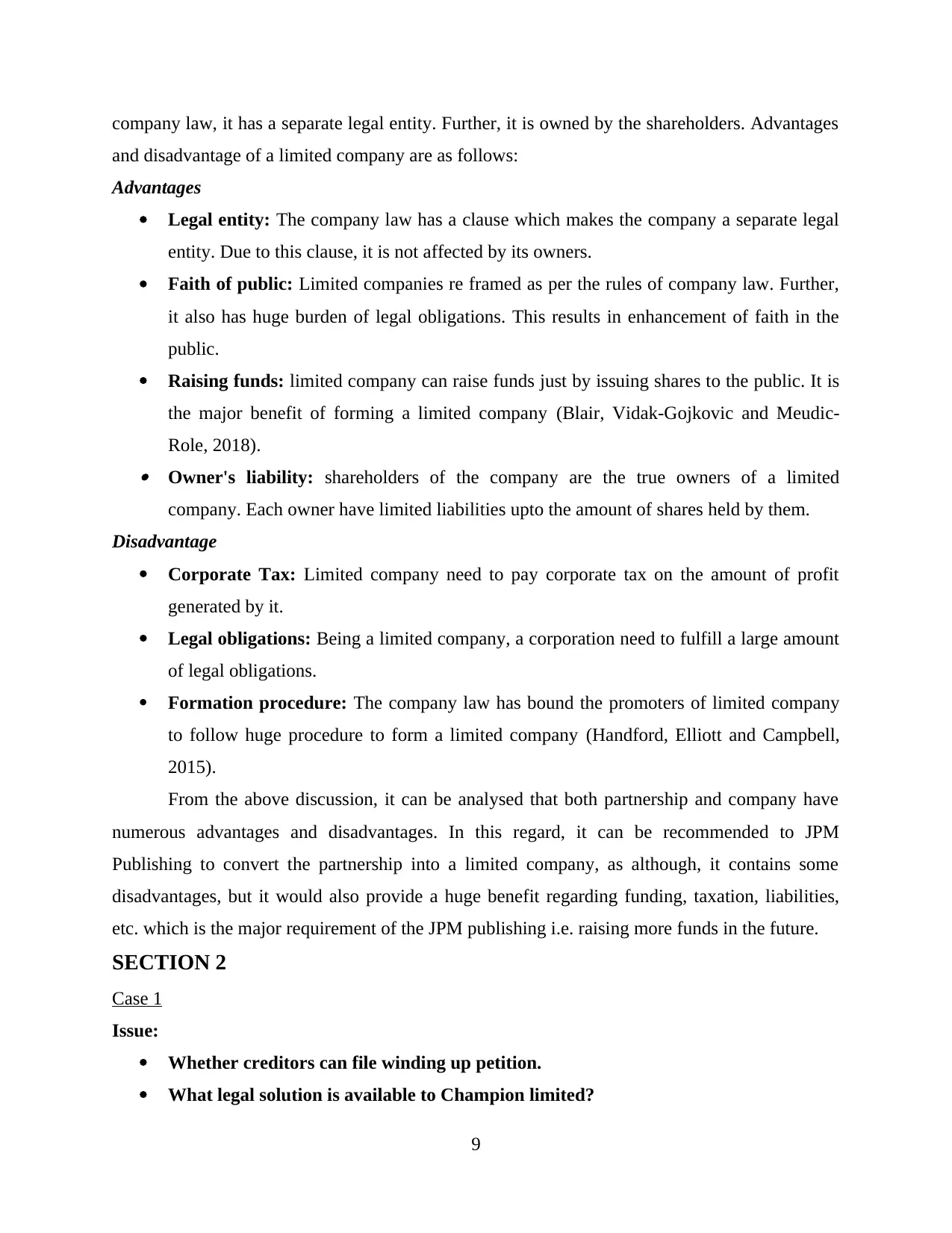
company law, it has a separate legal entity. Further, it is owned by the shareholders. Advantages
and disadvantage of a limited company are as follows:
Advantages
Legal entity: The company law has a clause which makes the company a separate legal
entity. Due to this clause, it is not affected by its owners.
Faith of public: Limited companies re framed as per the rules of company law. Further,
it also has huge burden of legal obligations. This results in enhancement of faith in the
public.
Raising funds: limited company can raise funds just by issuing shares to the public. It is
the major benefit of forming a limited company (Blair, Vidak-Gojkovic and Meudic-
Role, 2018). Owner's liability: shareholders of the company are the true owners of a limited
company. Each owner have limited liabilities upto the amount of shares held by them.
Disadvantage
Corporate Tax: Limited company need to pay corporate tax on the amount of profit
generated by it.
Legal obligations: Being a limited company, a corporation need to fulfill a large amount
of legal obligations.
Formation procedure: The company law has bound the promoters of limited company
to follow huge procedure to form a limited company (Handford, Elliott and Campbell,
2015).
From the above discussion, it can be analysed that both partnership and company have
numerous advantages and disadvantages. In this regard, it can be recommended to JPM
Publishing to convert the partnership into a limited company, as although, it contains some
disadvantages, but it would also provide a huge benefit regarding funding, taxation, liabilities,
etc. which is the major requirement of the JPM publishing i.e. raising more funds in the future.
SECTION 2
Case 1
Issue:
Whether creditors can file winding up petition.
What legal solution is available to Champion limited?
9
and disadvantage of a limited company are as follows:
Advantages
Legal entity: The company law has a clause which makes the company a separate legal
entity. Due to this clause, it is not affected by its owners.
Faith of public: Limited companies re framed as per the rules of company law. Further,
it also has huge burden of legal obligations. This results in enhancement of faith in the
public.
Raising funds: limited company can raise funds just by issuing shares to the public. It is
the major benefit of forming a limited company (Blair, Vidak-Gojkovic and Meudic-
Role, 2018). Owner's liability: shareholders of the company are the true owners of a limited
company. Each owner have limited liabilities upto the amount of shares held by them.
Disadvantage
Corporate Tax: Limited company need to pay corporate tax on the amount of profit
generated by it.
Legal obligations: Being a limited company, a corporation need to fulfill a large amount
of legal obligations.
Formation procedure: The company law has bound the promoters of limited company
to follow huge procedure to form a limited company (Handford, Elliott and Campbell,
2015).
From the above discussion, it can be analysed that both partnership and company have
numerous advantages and disadvantages. In this regard, it can be recommended to JPM
Publishing to convert the partnership into a limited company, as although, it contains some
disadvantages, but it would also provide a huge benefit regarding funding, taxation, liabilities,
etc. which is the major requirement of the JPM publishing i.e. raising more funds in the future.
SECTION 2
Case 1
Issue:
Whether creditors can file winding up petition.
What legal solution is available to Champion limited?
9
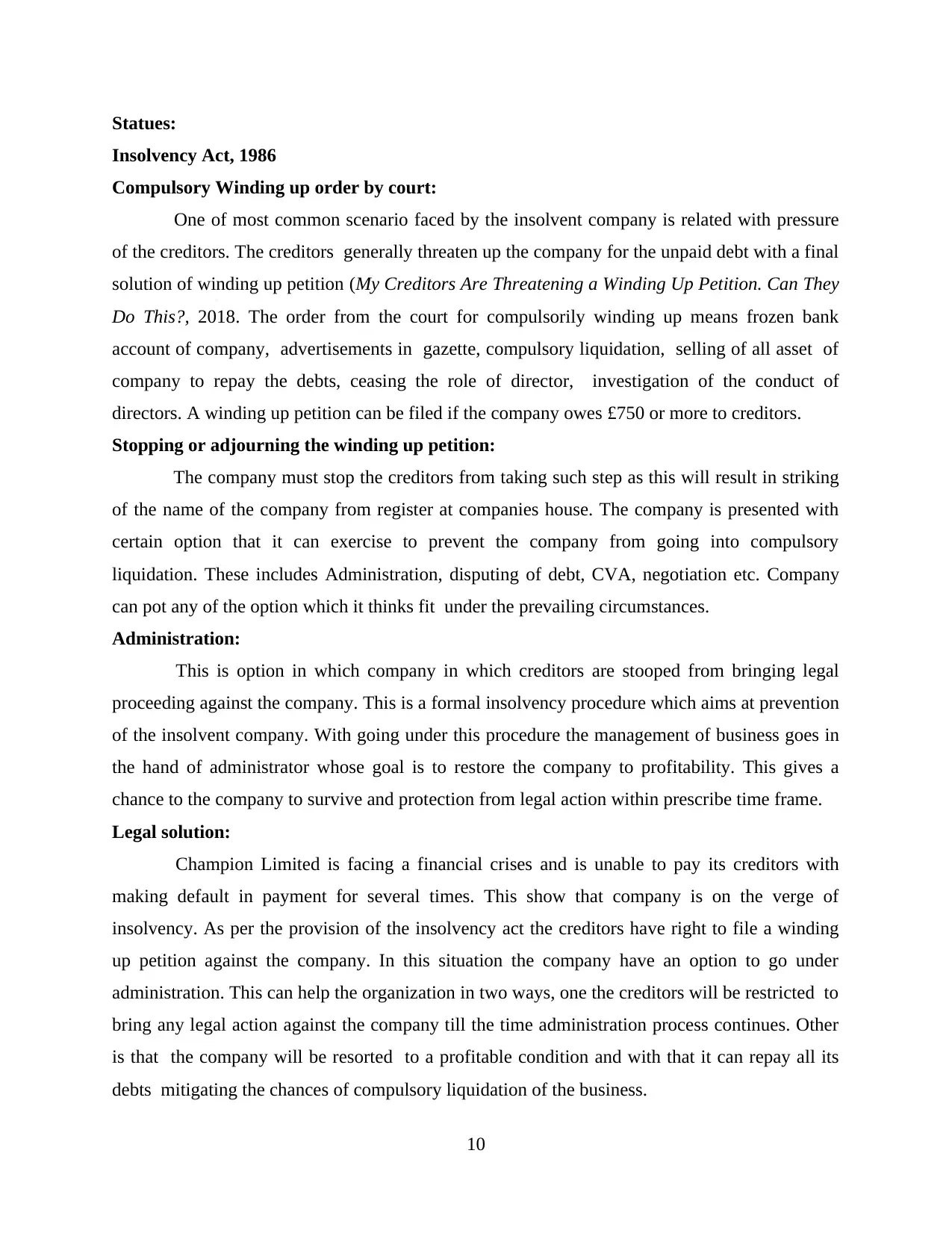
Statues:
Insolvency Act, 1986
Compulsory Winding up order by court:
One of most common scenario faced by the insolvent company is related with pressure
of the creditors. The creditors generally threaten up the company for the unpaid debt with a final
solution of winding up petition (My Creditors Are Threatening a Winding Up Petition. Can They
Do This?, 2018. The order from the court for compulsorily winding up means frozen bank
account of company, advertisements in gazette, compulsory liquidation, selling of all asset of
company to repay the debts, ceasing the role of director, investigation of the conduct of
directors. A winding up petition can be filed if the company owes £750 or more to creditors.
Stopping or adjourning the winding up petition:
The company must stop the creditors from taking such step as this will result in striking
of the name of the company from register at companies house. The company is presented with
certain option that it can exercise to prevent the company from going into compulsory
liquidation. These includes Administration, disputing of debt, CVA, negotiation etc. Company
can pot any of the option which it thinks fit under the prevailing circumstances.
Administration:
This is option in which company in which creditors are stooped from bringing legal
proceeding against the company. This is a formal insolvency procedure which aims at prevention
of the insolvent company. With going under this procedure the management of business goes in
the hand of administrator whose goal is to restore the company to profitability. This gives a
chance to the company to survive and protection from legal action within prescribe time frame.
Legal solution:
Champion Limited is facing a financial crises and is unable to pay its creditors with
making default in payment for several times. This show that company is on the verge of
insolvency. As per the provision of the insolvency act the creditors have right to file a winding
up petition against the company. In this situation the company have an option to go under
administration. This can help the organization in two ways, one the creditors will be restricted to
bring any legal action against the company till the time administration process continues. Other
is that the company will be resorted to a profitable condition and with that it can repay all its
debts mitigating the chances of compulsory liquidation of the business.
10
Insolvency Act, 1986
Compulsory Winding up order by court:
One of most common scenario faced by the insolvent company is related with pressure
of the creditors. The creditors generally threaten up the company for the unpaid debt with a final
solution of winding up petition (My Creditors Are Threatening a Winding Up Petition. Can They
Do This?, 2018. The order from the court for compulsorily winding up means frozen bank
account of company, advertisements in gazette, compulsory liquidation, selling of all asset of
company to repay the debts, ceasing the role of director, investigation of the conduct of
directors. A winding up petition can be filed if the company owes £750 or more to creditors.
Stopping or adjourning the winding up petition:
The company must stop the creditors from taking such step as this will result in striking
of the name of the company from register at companies house. The company is presented with
certain option that it can exercise to prevent the company from going into compulsory
liquidation. These includes Administration, disputing of debt, CVA, negotiation etc. Company
can pot any of the option which it thinks fit under the prevailing circumstances.
Administration:
This is option in which company in which creditors are stooped from bringing legal
proceeding against the company. This is a formal insolvency procedure which aims at prevention
of the insolvent company. With going under this procedure the management of business goes in
the hand of administrator whose goal is to restore the company to profitability. This gives a
chance to the company to survive and protection from legal action within prescribe time frame.
Legal solution:
Champion Limited is facing a financial crises and is unable to pay its creditors with
making default in payment for several times. This show that company is on the verge of
insolvency. As per the provision of the insolvency act the creditors have right to file a winding
up petition against the company. In this situation the company have an option to go under
administration. This can help the organization in two ways, one the creditors will be restricted to
bring any legal action against the company till the time administration process continues. Other
is that the company will be resorted to a profitable condition and with that it can repay all its
debts mitigating the chances of compulsory liquidation of the business.
10
⊘ This is a preview!⊘
Do you want full access?
Subscribe today to unlock all pages.

Trusted by 1+ million students worldwide
1 out of 17
Related Documents
Your All-in-One AI-Powered Toolkit for Academic Success.
+13062052269
info@desklib.com
Available 24*7 on WhatsApp / Email
![[object Object]](/_next/static/media/star-bottom.7253800d.svg)
Unlock your academic potential
Copyright © 2020–2026 A2Z Services. All Rights Reserved. Developed and managed by ZUCOL.





